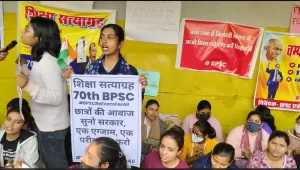For nearly two months, the central government and its agencies have claimed that India’s economy is on the path to a clear “V-shaped recovery” – improving sharply after the collapse caused by the Covid-19 lockdown in March 2020. On the eve of Republic Day, President Ram Nath Kovind also commended the economy for recovering quickly after lockdown restrictions were lifted in phases.
But does this revival – often a reference to rising gross domestic product or GDP – translate into a recovery of the millions of jobs lost during the early months of the pandemic? Are the unemployed of 2020 back into the workforce? Statistics indicate otherwise. For a country whose economy has been on a downward slope since demonetisation in 2016, India’s management of the pandemic proved to be the final nail in the coffin.
According to data from the Centre for Monitoring Indian Economy, the country’s unemployment rates shot up from 8% in March 2020 to as much as 24% in April 2020 – an immediate impact of the lockdown. As people returned to formal and informal jobs in the following months, unemployment rates shrank once again, falling to 6.5% in November 2020.
Instead of a clear “V-shaped” recovery, however, Indian joblessness has worsened in the past two months. In December 2020, unemployment rates rose to 9%, with as many as 90 lakh people losing jobs between September and December.
On January 27, a Covid-19 livelihoods survey released by the Azim Premji University reiterated the problem: at least 20% of those who had lost work during the lockdown were still unemployed in December, with urban areas hit worse than rural and women hit harder than men.
With the 2021 Union Budget coming up on February 1, Scroll.in spoke to urban salaried professionals who lost their jobs during the lockdown and continue to be unemployed months later. For them, claims of India’s economic recovery are nothing but a mirage.
‘Companies want to hire younger people’
Vijeta Salani, 37, Mumbai
Last employed as an accountant in an apparel firm
After 12 years of working in a stable job as an accountant for a small apparel manufacturer, Vijeta Salani never imagined she would have to create accounts on every job-search platform available in India. But since July 2020, Salani has had no option but to hunt far and wide for any job in her field.
Two months after the start of the Covid-19 lockdown, Salani’s company started laying off the majority of its employees. Salani was one of them, serving her last day on June 30. “I gave 12 years to the company and they have not even given me my gratuity yet,” said Salani, a 37-year-old resident of Vasai in Mumbai’s northern suburbs. “It feels like the ground has been pulled from under my feet.”
In the months since she lost her job, Salani has briefly worked as an accountant at her friend’s family business, but had to give it up when the company’s older accountant returned from his village. “I’m now also making papad and khakhra at home, and selling them through WhatsApp and Facebook,” said Salani, whose attempts at running this home-based business are yet to pay off.
“I am looking for jobs everywhere and have gone for around five interviews, but there are dozens of people applying for every post and often companies prefer hiring younger people who need to be paid less compared to senior staff like me,” she said.
Salani was the primary breadwinner of her family, earning Rs 30,000 a month at the apparel manufacturing company. Along with her husband, a marketing executive who brings home Rs 22,000, she had been able to provide a comfortable life for her 14-year-old daughter. “But this year we have not even been able to pay her annual school fees of Rs 60,000,” said Salani, who is grateful to her daughter’s school for allowing them time to pay their dues.
Salani is also grateful that her family owns their one-room-kitchen home in Vasai, exempting her from the stress of monthly rent. But with a drastic change in their monthly income, the family has had to make changes to their daily eating habits. “We are eating more of the vegetables that are cheaper and less of oil, onions and expensive vegetables,” said Salani. “So far my daughter is coping with this change very well, but I hope that in this Budget, the government provides some relief measures for people who have lost salaried jobs, like me.”
‘A terrible time to be unemployed’
Dhaval Mishra, 33, Gurgaon
Last employed as a manager in a travel company
A year ago, Dhaval Mishra (name changed) thought he was on his way to be promoted to the head of his marketing team at the travel and tourism company he had joined in 2014. Instead, during appraisal season in April 2020, he was asked to leave the company along with 12 others on his team.
“Logically, I can understand it – the pandemic killed the travel industry and the company had to make some hard choices,” said Mishra, a 33-year-old resident of Gurgaon. “But my son had just been born in January [2020] and my wife had quit her job because of complications during pregnancy. It was a terrible time to be unemployed.”
Nine months since his job loss, neither Mishra nor his wife – a school teacher – have been able to get back into the salaried workforce. “We are in two different fields, but we hear the same thing wherever we apply for jobs – there is a freeze in hiring right now, we should try again in a few months.”
Mishra said he would be satisfied with accepting any mid-level marketing position he can get. For several months, he has also considered applying for a private or government loan to start his own business. “I have an idea for an app to market local tours, but it is scary to take risks with a start-up when you have a baby to care for,” he said.
Mishra did not wish to reveal his income from his last job, but admitted that his personal savings were now drying out. “I have already broken a few fixed deposits to be able to continue paying our home loan instalments,” said Mishra. His wife has been managing household expenses by taking up home tuition gigs for children in their neighbourhood. “Thankfully my brother still has his job in the US, so he has been able to look after our parents.”
Mishra’s only expectations from the upcoming Budget is bigger tax breaks for ordinary citizens. “Covid is not the government’s fault – the whole world is suffering,” said Mishra. “There is no magic wand with which they can just create more jobs, especially in the private sector.”
‘I am starting to panic now’
Ameesha Reddy, 26, Bangalore
Last employed as a graphic designer in a technology firm
At least six months before the March 2020 lockdown, Ameesha Reddy (name changed) decided she wanted to quit her job and look for better prospects. The 26-year-old had spent three years working as an in-house graphic designer for a multinational information technology firm, and had grown unhappy with the monotony of her tasks. Her salary of Rs 63,000 a month, she felt, did not do justice to her post-graduate degree from a reputed design institute in Bangalore.
“I wanted a job that would let me express myself more creatively, but even after six months of looking, I couldn’t find anything,” said Reddy. “The job scene seemed quite dry, so when the lockdown happened and I heard stories of mass layoffs in other companies, I decided I would stay put at my job for at least another year.”
In June 2020, however, Reddy’s company laid off 35 employees, including her entire team. She suddenly found herself at sea in an even bleaker job market. “I have applied to at least 40 places in the past seven months, and was called for just three interviews. Getting a job in my field seems to be impossible right now,” she said. “Companies don’t want to hire full-time designers, and the few that are hiring want to pay a fresher’s salary.”
Reddy has been able to get small freelance assignments through her period of unemployment, designing logos, websites and brand identities for friends and start-ups. “But these don’t pay too well, so financially I am starting to panic now.”
Up till November 2020, Reddy had been able to rely on her savings and freelance earnings to pay her rent of Rs 18,000 and manage daily expenses. “I could have lasted longer, but in September my laptop crashed and I needed to buy a new one, which was a huge expense,” she said. For the past two months, Reddy has had to ask her father – a retired engineer in Hyderabad – for financial assistance. “My parents are happy to support me for now, but my dad is a heart patient. What if someone gets Covid in the family or if there is an unexpected medical expense?”
Reddy is not sure what to expect or wish for from the Union Budget on February 1. “But I wish the government would stop saying that our economy is improving. It’s clearly not.”
‘I am willing to learn any skill’
Jai Medge, 20, Mumbai
Last employed in a film distribution company
In July 2020, when Jai Medge was told his company was shutting down, he had already spent seven uncertain months without a salary. The 20-year-old college dropout had landed the job with a small film distribution company in July 2019, performing an array of administrative roles including communication with movie theatres and scrutinising balance sheets. For this, he was paid Rs 10,000 a month.
“But in December 2019, they stopped paying me and kept giving me assurances that the money would come,” said Medge. At the start of the Covid-19 lockdown in March 2020, his office “temporarily” halted operations and closed down completely within three months. “The company owes me so much money, but my boss is not even answering my calls anymore,” said Medge, who has been unemployed for seven months and unpaid for fourteen.
As the only son of a manual labourer and domestic worker, this financial loss has weighed heavily on Medge and his family. Before the lockdown, his parents earned a total of Rs 15,500 a month, spending Rs 7,000 on rent and Rs 5,000 for paying off a loan. For the first few months of young Medge’s new job, the family was filled with hope about better times that seemed to have begun. “But now our debt is piling up and we are stressed all the time,” he said. “The lockdown has ruined everything.”
Medge has lost count of the number of companies and small businesses he has approached in the hope of finding a new job. “I am willing to learn any skill and work in any field, but nobody is hiring right now. They all say that they themselves have fired their staff and cannot afford anyone new,” he said.
In recent months, Medge has managed to get a few freelance jobs with party decorators and photographers, and occasionally delivers parcels on behalf of friends who work with e-commerce companies. “But that just brings random pocket money – it’s not the same as having a stable job,” said Medge. “If things don’t get back to normal in the next few months, I cannot even imagine what we will do.”
(Article courtesy: Scroll.in.)




